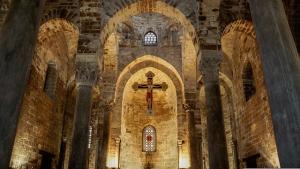
In one of the most emotionally wrenching and theologically complex events depicted in the Gospels, Jesus’ cry of dereliction seems to suggest that either God abandoned Jesus or that Jesus was not God.
In this paper, I will seek to explain what the cry of dereliction means and seek to explain Jesus’ death cry. I will begin by showing that it is a mistake to construe Jesus’ words on the Cross as evidence that God the Father abandoned Jesus. I will also argue that the death cry cannot be understood as proof that Jesus is not God.
Upon clearing the ground of these two arguments, I will seek to show that Jesus’ death cry needs to be understood within a messianic and soteriological framework.
The Cry Of Dereliction
The cry of dereliction refers to the words spoken by Jesus while on the Cross, as depicted in both Matthew and Mark’s Gospel. As Jesus is dying on the Cross, he yells out, “Eli, Eli, lema sabachthani?” which means, “My God, my God, why have you forsaken me?” For some, this statement is evidence that Jesus is not God or that God had somehow abandoned Jesus on the Cross.
Before arguing how Catholics should understand the cry of dereliction, it is necessary to address the two common inferences that are often drawn. The first is to conclude that Jesus’ words are evidence that He is not God. This inference can be refuted by Jesus’ ministry, which included Jesus’ own words (“I and the Father are one“), miraculous healings, raising people from the dead, and prophecies, including prophesizing about His own death. However, the strongest evidence for Jesus’ divinity lies in His capacity to forgive sins and His Resurrection from the dead. Both of these powers are reserved for God alone.
The second conclusion that needs to be refuted is that God had abandoned Jesus, Who is His Son. To that, I turn next.
Did God Abandon Jesus?
As is common with Scripture, there is often a level of complexity that is not always easily apparent. This is certainly the case with Jesus’ death cry. In order to analyze Jesus’ words, we must examine them in light of messianic prophecy and soteriology.
The words chosen by Christ are not original. Rather Jesus is quoting a prayer of David. In Psalm 22, David writes, “My God, my God, why have you abandoned me?” Later in the Psalm, David writes, “They have pierced my hands and my feet. I can count all my bones.” It appears that David is describing himself being crucified. Yet David never experienced crucifixion, so what is the Psalm referring to? It is referring to Jesus.
Psalm 22 is a prophecy concerning the Messiah. By quoting Psalm 22, Jesus is showing that He is the new David, the new King of Israel, and the Messiah foretold in the Jewish Scriptures. Understood in this way, we can see that Jesus’ prayer is not the cry of one who meets death with despair or of one who God has abandoned, but rather as one who is asserting Himself as Savior.
Additionally, we can understand Jesus’ words as evidence of His solidarity with our fallen humanity. For this reason, the Catechism of the Catholic Church states, “In the redeeming love that always united him to the Father, he assumed us in the state of our waywardness of sin, to the point that he could say in our name from the cross: ‘My God, my God, why have you forsaken me?’. His is a suffering in communion with us and for us, which derives from love and already bears within it redemption, the victory of love.”
In order to understand why this is the case, we must understand the effects and burden of sin.
Christ And The Burden Of Sin
While it is incorrect to argue that Jesus is not God or that the Father had somehow abandoned him, it is accurate to suggest that Jesus felt those emotions to some degree. The reason for this is that Jesus took upon Himself our sins and our punishment. Since an effect of sin is to separate one from God, it is logical to infer that Jesus felt this separation at some psychological level. At some point before He died, before the veil was torn in two, before He cried out, “it is finished,” Jesus took upon Himself the wrath and punishment that human sin deserved and satisfied the debt owed to God.
In a sense, Jesus makes his own the whole of Psalm 22, the Psalm of the suffering People of Israel. In this way, he takes upon Himself the sin of all people, and, at the same time, he places all this before God’s own heart, in the certainty that his cry will be heard in the Resurrection. “The cry of extreme anguish is at the same time the certainty of an answer from God, the certainty of salvation – not only for Jesus himself but for the many.” (Benedict, Pope. Jesus of Nazareth. 2007).
Conclusion
“All the troubles, for all time, of humanity enslaved by sin and death, all the petitions and intercessions of salvation history, are summed up in this cry of the incarnate Word. Here the Father accepts them and, beyond all hope, answers them by raising his Son.” (Catechism of the Catholic Church, Paragraph 2606).
In this paper, I have sought to explain the cry of dereliction. I have suggested that Jesus’ cry from the Cross is neither evidence that He is not God nor is it meant to imply that the Father abandoned Jesus. Rather, Jesus’ words are meant to show that He is the Messiah foretold in the Scriptures and the Savior of mankind.















